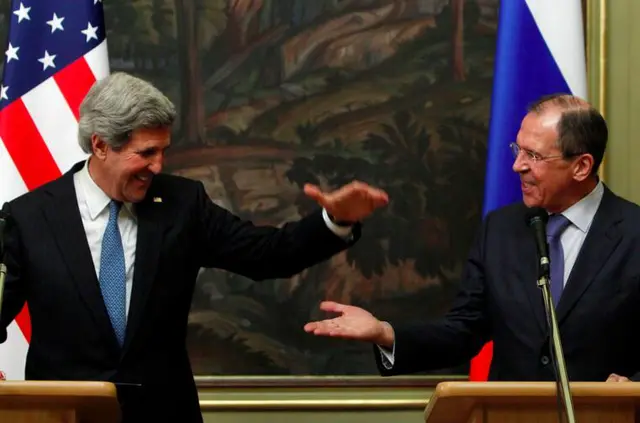The recently-agreed upon cessation of hostilities in Syria has high chances of success, despite the fact that its implementation will not be an easy task, analysts say.
There are two reasons that make the success chances high, Hmaidi Abdullah, a Syrian political researcher, said.
The first is the time factor, meaning that the United States and its allies have been convinced that any more procrastination in establishing a cessation of hostilities in Syria will not be in their interest, especially after the sweeping progress by the Syrian army against key rebel strongholds in northern Syria.
The Syrian army backed by Russia and fighters of the Lebanese Hezbollah group has been on a crushing offensive against key rebel strongholds near Turkey, which raised the ire of Ankara as its interests with the rebels in northern Syria have largely been threatened.
The declared goal of the Syrian army operation near Turkey is to close the borders, through which much of the rebels and their fund enter Syria.
"If the time passed by without a ceasefire, the Syrian army and its allies will continue to push forward to capture more areas from the rebels, which means a change in the power balance in favor of the Syrian army again," Abdullah told Xinhua.
The second reason, Abdullah continued, is that the new agreement includes certain mechanisms in terms of parties that are either included or excluded from the ceasefire, as the truce excludes the Islamic State (IS) group and the al-Qaida-linked Nusra Front, as both groups have been designated as terrorist organizations by the UN.
"There are mechanisms to resolve the ambiguous issues," he said, adding that "those two reasons will make the success chances higher than any previous initiatives."
Russia and the United States agreed to enforce a cessation of hostilities starting from Feb. 27.
Any party engaged in conflicts in Syria will indicate to Russia or the United States their commitment to and acceptance of the terms for the cessation of hostilities by no later than 12:00 Damascus time (1000 GMT) on Feb. 27, according to a joint statement issued by the U.S. State Department.
Meanwhile, Abdullah, who runs a political research center in Damascus, said there are obstacles that could face the implementation of the cessation of hostilities.
On the field level, the areas under the rebels control are largely overlapped, which makes it difficult to target one group that is excluded from the ceasefire, without hitting the another group included in the truce.
Meanwhile, Abdullah warned that the collapse of the ceasefire means that Syria is ahead of a long war, meaning that the military confrontation would continue.
"A prolonged war is in no one's interest," he said.
But in case the cessation of hostilities succeeded, the mechanisms of reaching a political solution will be enhanced.
"There would be a dialogue which would lead to the formation of a new government with the participation of some opposition parties after the settlement of the situation on ground. Then, elections will take place for a transitional period in accordance to the agreement of the world powers in Vienna," Abdullah said.
In November 2015, Russia, the United States and powers from Europe and the Middle East agreed in Vienna on a time table of establishing a transition government of Syria, and to hold an election within 18 months.
They also agreed that fighting the IS is a priority in the course of achieving a political settlement in Syria.
"The success of the cessation of hostilities means the return to the Vienna agreement," Abdullah noted.
For his part, Muin Ibrahim, another political analyst, told Xinhua that the success of the ceasefire would be the first step to bring to a halt the violence in Syria.
Mahmud Muri, the head of the oppositional Democratic Work Body, said that "there are several parities that want this ceasefire to be successful because the situation in the country has reached a very delicate phase, either more militarization or a political solution."
Muri also pointed out to the difficulties that face the ceasefire, mainly the decentralization of the rebels leadership and their intractable relations with one another, in addition to the undeclared alliances some rebel groups have with either al-Nusra or the IS.
In order to ensure the best results, the borders, from which the militants are getting arms and supplies, should be closed off, he said, agreeing with the government line that terrorists must not be allowed to exploit the ceasefire.
Syrian Minister of National Reconciliation Ali Haidar said on Tuesday that the cessation of hostilities must not affect the war on terror.
In a briefing, the minister hailed the government acceptance to observe a cessation of hostilities as agreed upon by the U.S. and Russia.
Syria's Foreign Ministry warned that the Syrian army has the right to respond to any violation of the ceasefire by the opposition forces against the people, or the military forces.
Syrian President Bashar al-Assad also said he is ready for ceasefire in Syria on condition that the "terrorists" don't exploit it.
In a recent interview with the Spanish newspaper El Pais, whose script was published by SANA, Assad said halting the military operations in Syria demands deterring the terrorists from exploiting it to enhance their positions.
He said that countries, like Turkey, must stop sending more terrorists and arms as well as providing logistical support to the terrorists.
"Of course... we have declared that we are ready (to respect a cessation of military operations), but the matter is not only about declaring it because the another party may declare the same thing. It's about what will be done on ground," he said. Enditem
 简体中文
简体中文

